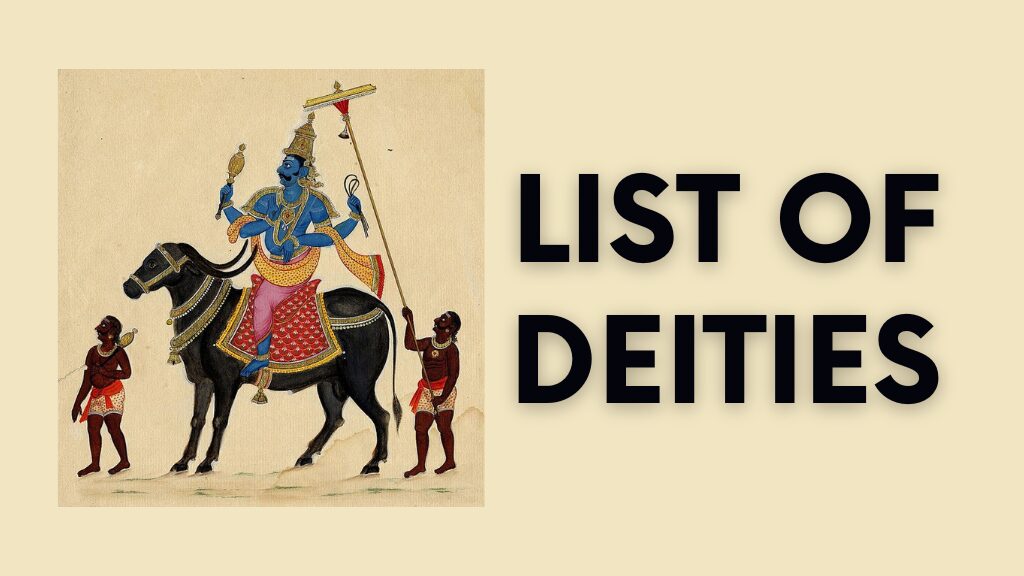Throughout human history, civilizations across the world have worshipped and revered higher powers in various forms, giving rise to a vast and diverse list of deities. These deities are more than mythological figures; they reflect human attempts to understand nature, morality, life, and death. Each culture’s gods and goddesses embody their people’s values, fears, and hopes, representing natural forces, cosmic balance, or divine justice. From the mighty gods of Mount Olympus to the sacred figures of Hinduism, deities have shaped religious beliefs, rituals, and cultural traditions that continue to influence societies today.
The Role of Deities in Human Belief Systems
These sacred beings serve as powerful symbols and mediators between the human and spiritual realms. They embody aspects of the natural world such as the sun, moon, rain, or fertility, as well as abstract concepts like love, wisdom, and justice. Many societies have looked to them for protection, blessings, and moral guidance, shaping both individual practices and communal traditions. The study of these figures is not just about religion, but also about history, anthropology, and the human imagination. By examining these spiritual entities, we gain insights into how ancient and modern cultures perceive the divine and construct their spiritual narratives.
Major Categories of Deities
Sky and Celestial Deities
Sky gods and celestial beings are among the most ancient forms of worship. Many cultures have associated divine power with the heavens, where phenomena like storms, lightning, and celestial bodies occur. Deities such as Zeus in Greek mythology, Indra in Hindu traditions, and the Egyptian sun god Ra represent this category. They are often depicted as rulers of both natural and cosmic order, commanding authority over life, weather, and destiny.
Earth and Nature Deities
Nature deities personify the land, plants, animals, and natural cycles. They symbolize fertility, harvest, and the interconnectedness of life. Examples include Demeter, the Greek goddess of agriculture, and Gaia, the personification of Earth itself. In many indigenous traditions, spirits of rivers, forests, and mountains are revered as deities, reinforcing the belief that nature is sacred and alive.
Underworld and Death Deities
Every culture has grappled with the mystery of death, leading to the worship of gods and goddesses of the underworld. These deities govern the realms of the dead and the afterlife. Hades from Greek mythology, Osiris from Egypt, and Hel from Norse tradition are key figures in this domain. They represent the inevitability of death but also the possibility of rebirth or continuation beyond mortal life.
Love and Fertility Deities
Love, beauty, fertility, and procreation have always been central to human societies, giving rise to deities who embody these qualities. Aphrodite in Greek mythology, Freyja in Norse legends, and Parvati in Hinduism exemplify this category. These gods and goddesses are often associated with growth, sensuality, and the nurturing power of life itself.
War and Protection Deities
Many cultures revered gods and goddesses of war, who embodied strength, valor, and the chaotic energy of battle. Ares and Athena in Greek mythology, Mars in Roman tradition, and Sekhmet in Egyptian mythology are prominent examples. Beyond warfare, these deities often served as protectors of cities and guardians of people, symbolizing courage and resilience.
Wisdom and Knowledge Deities
The pursuit of wisdom and knowledge led to the creation of deities associated with intellect, learning, and guidance. Athena, goddess of wisdom, and Thoth, the Egyptian god of writing and knowledge, are iconic figures. These deities represent humanity’s quest for truth and the divine connection between wisdom and leadership.
Trickster and Chaos Deities
Trickster figures and chaos gods embody unpredictability and disruption. While sometimes feared, they also symbolize creativity, transformation, and the breaking of boundaries. Loki from Norse mythology, Coyote from Native American traditions, and Set from Egyptian mythology fall into this category. They challenge order but also bring renewal and change.
Household and Domestic Deities
In many traditions, families revered small household gods who ensured safety, prosperity, and harmony within the home. The Roman Lares and Penates, for example, were guardians of households and family wealth. These deities represent the intimate relationship between daily human life and divine protection.
Creator and Supreme Deities
Many religions recognize creator gods or supreme deities who bring the universe into existence and maintain its order. Brahma in Hinduism, Ahura Mazda in Zoroastrianism, and the Abrahamic God of Judaism, Christianity, and Islam embody this role. These deities transcend specific aspects of life, representing ultimate authority and divine unity.
Regional and Cultural Variations of Deities
Greek and Roman Pantheon
Greek and Roman mythology contains some of the most well-documented deities. The Olympian gods, including Zeus, Hera, Poseidon, and Apollo, governed various aspects of life and nature. The Romans adapted many Greek deities, often renaming them while preserving their roles.
Egyptian Deities
Egyptian mythology features a rich pantheon tied to natural elements and the afterlife. Ra, Isis, Osiris, Anubis, and Hathor are among the most significant. These deities reflect the Egyptian focus on cosmic balance, immortality, and the cycle of life and death.
Hindu Deities
Hinduism has one of the most extensive divine traditions, encompassing gods and goddesses representing creation, preservation, and destruction. Major figures include Brahma, Vishnu, Shiva, Lakshmi, and Durga. Each deity is associated with specific aspects of the universe, rituals, and stories found in sacred texts. Unlike many other traditions, Hinduism embraces a fluid and inclusive approach, allowing regional variations, personal devotion, and philosophical interpretations of these divine beings.
Norse Deities
The Norse pantheon, rooted in Scandinavian traditions, features gods such as Odin, Thor, Freyja, and Loki. These deities embody themes of heroism, destiny, and the harsh realities of nature. They are deeply tied to mythic cycles of creation, destruction, and renewal.
Celtic Deities
Celtic traditions include numerous gods and goddesses tied to natural forces and tribal life. Figures like Dagda, Brigid, and Lugh symbolize fertility, poetry, craftsmanship, and battle. These deities reflect the strong connection between the Celts and their natural environment.
Indigenous Deities
Across the world, indigenous cultures honor deities linked to their specific landscapes and traditions. From Native American spirits to African tribal gods, these deities often blend mythology with lived experience. They reinforce cultural identity and the sacred relationship between humanity and nature.
Influence of Deities on Modern Culture
The legacy of deities persists in art, literature, and modern spirituality. Ancient gods and goddesses appear in novels, films, and popular culture, symbolizing timeless archetypes of love, power, wisdom, and conflict. Contemporary spiritual practices also draw inspiration from ancient traditions, reinterpreting deities as symbols of personal growth and universal truths. By studying the vast list of deities, we not only understand history but also see how myth continues to shape modern imagination.
FAQs
What is a deity?
A deity is a divine being worshipped or revered as a god or goddess, often representing natural forces, abstract qualities, or cosmic principles.
Why do different cultures have different deities?
Different cultures develop unique deities based on their environment, values, and worldviews. These deities reflect local traditions and collective experiences.
Are deities still worshipped today?
Yes, many deities are actively worshipped in religions such as Hinduism, Shintoism, and various indigenous spiritual practices. Others survive mainly in mythology and cultural symbolism.
What is the difference between a god and a goddess?
A god generally refers to a male deity, while a goddess refers to a female deity. Together, they reflect diverse aspects of divinity across cultures.
How does mythology influence modern life?
Mythology continues to shape art, literature, films, and spiritual practices. The stories of deities provide timeless lessons and archetypes that resonate with human experience.
Conclusion
The exploration of the list of deities offers a window into humanity’s spiritual journey across time and space. Each god and goddess, whether from Greece, Egypt, India, or indigenous traditions, embodies a unique vision of the divine. Together, they form a rich tapestry of belief systems that highlight the human desire to connect with higher powers, understand existence, and seek meaning in the universe. These divine figures remind us that the search for transcendence is as old as humanity itself and continues to shape the way we perceive the world today.





